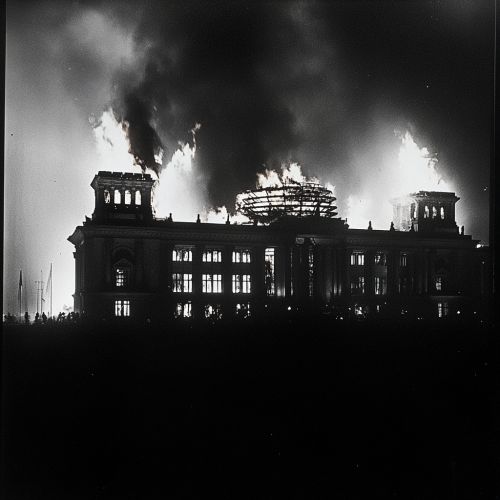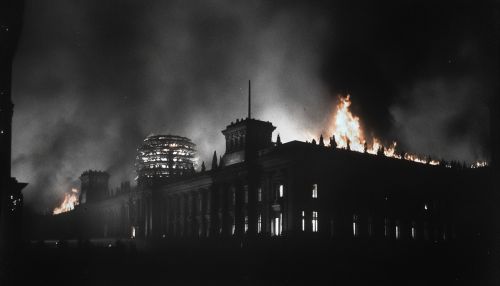Reichstag Fire Decree
Background
The Reichstag Fire Decree, officially known as the "Decree of the Reich President for the Protection of People and State" (German: Verordnung des Reichspräsidenten zum Schutz von Volk und Staat), was a pivotal legal instrument in the history of Nazi Germany. Issued on February 28, 1933, by President Paul von Hindenburg, the decree followed the Reichstag fire that occurred on February 27, 1933. The fire, which gutted the Reichstag building in Berlin, was a significant event that the Nazi Party used to consolidate its power and suppress opposition.
Context and Preceding Events
The political climate in Germany during the early 1930s was marked by instability and economic hardship. The Weimar Republic, established after World War I, faced numerous challenges, including hyperinflation, political extremism, and widespread unemployment. The Nazi Party, led by Adolf Hitler, capitalized on these issues, gaining significant support through promises of national rejuvenation and economic recovery.
On January 30, 1933, Hitler was appointed Chancellor of Germany. Despite this position, the Nazis did not have an outright majority in the Reichstag, the German parliament. The Reichstag fire provided an opportunity for the Nazis to strengthen their grip on power.
The Reichstag Fire
On the night of February 27, 1933, the Reichstag building was set ablaze. The fire was quickly blamed on communists, with Dutch communist Marinus van der Lubbe being arrested at the scene. The Nazis claimed that the fire was part of a larger communist plot to overthrow the government. This narrative was used to justify the need for emergency measures.
Issuance of the Decree
The day after the fire, President Hindenburg, under the influence of Hitler and his advisors, signed the Reichstag Fire Decree. The decree was issued under Article 48 of the Weimar Constitution, which allowed the president to take emergency measures to protect public safety and order.


Provisions of the Decree
The Reichstag Fire Decree contained several critical provisions that effectively dismantled many civil liberties guaranteed by the Weimar Constitution. Key elements included:
- **Suspension of Civil Liberties**: The decree suspended fundamental rights such as freedom of speech, freedom of the press, the right to assemble, and the privacy of postal, telegraphic, and telephonic communications.
- **Detention Without Trial**: It allowed for the arrest and detention of individuals without specific charges or the need for a court order.
- **Increased Police Powers**: The decree granted the police extensive powers to search homes, confiscate property, and detain individuals deemed a threat to state security.
- **Centralization of Authority**: It enabled the central government to take over the powers of state governments if they failed to maintain order.
Impact and Consequences
The immediate impact of the Reichstag Fire Decree was the arrest of thousands of political opponents, primarily communists and socialists. This crackdown effectively crippled the opposition and paved the way for the Nazi Party to dominate the upcoming elections.
The decree also marked a significant step towards the establishment of a totalitarian state. By suspending civil liberties and centralizing power, the Nazis were able to suppress dissent and eliminate political competition. The decree's provisions remained in effect throughout the Nazi regime, serving as a legal basis for many of the regime's repressive actions.
Legal and Historical Analysis
From a legal perspective, the Reichstag Fire Decree represented a profound departure from the principles of the Weimar Constitution. It effectively nullified the democratic safeguards that were intended to protect individual rights and maintain a balance of power.
Historically, the decree is seen as a critical moment in the Nazi consolidation of power. It demonstrated the regime's willingness to exploit crises to achieve its objectives and highlighted the fragility of democratic institutions in the face of authoritarian ambitions.
Legacy
The legacy of the Reichstag Fire Decree is a stark reminder of the dangers of unchecked executive power and the erosion of civil liberties. It serves as a case study in how legal mechanisms can be manipulated to undermine democracy and establish authoritarian rule.
